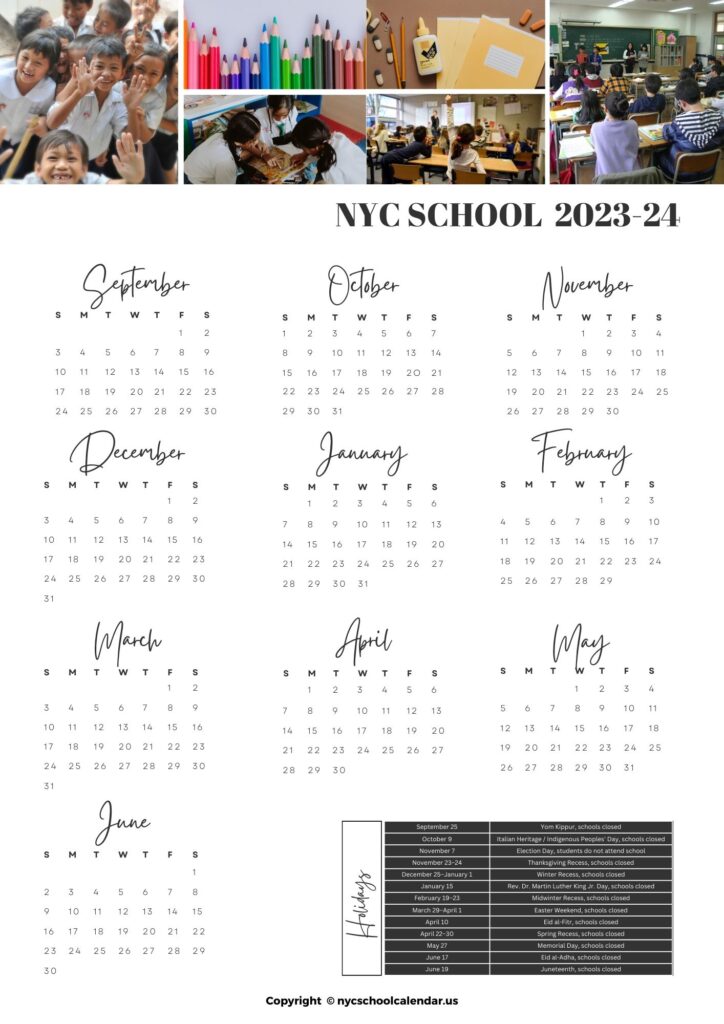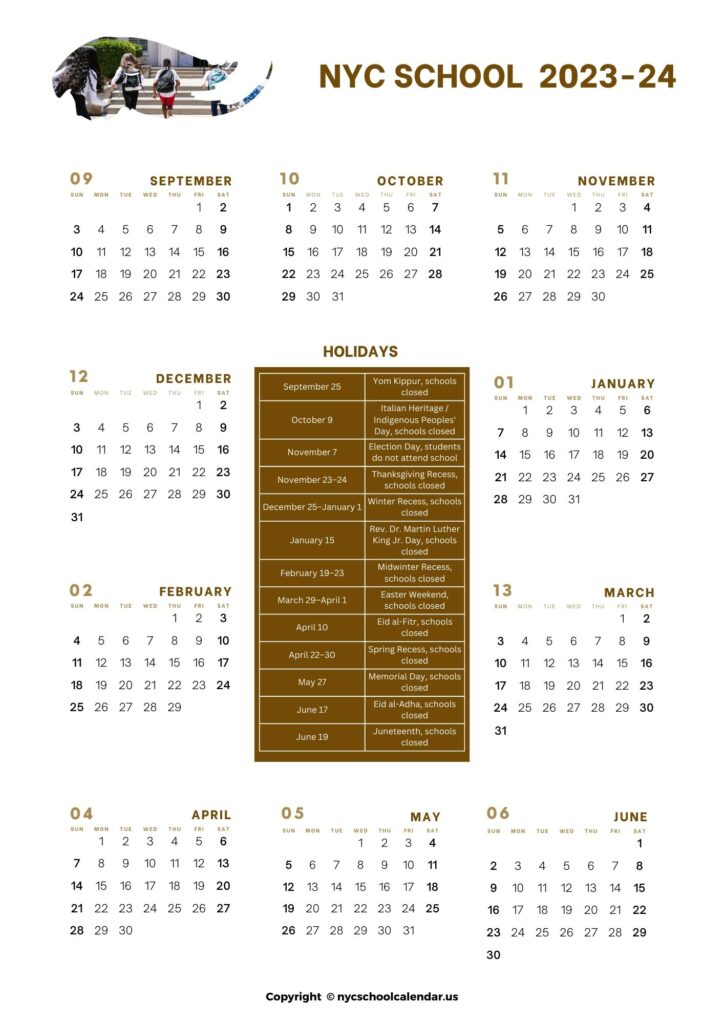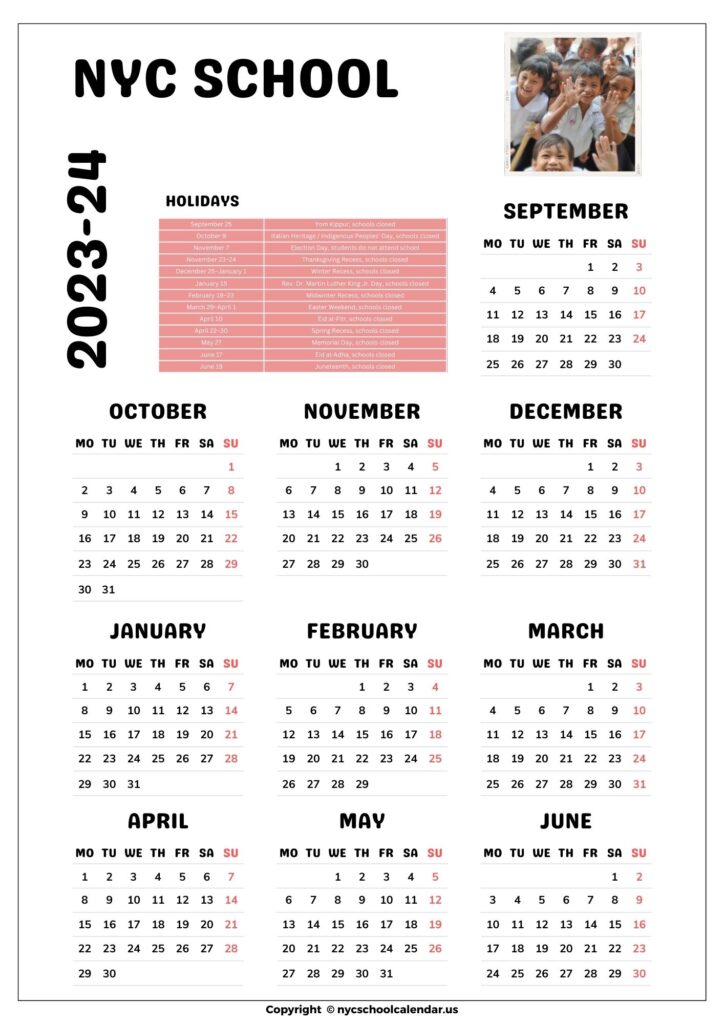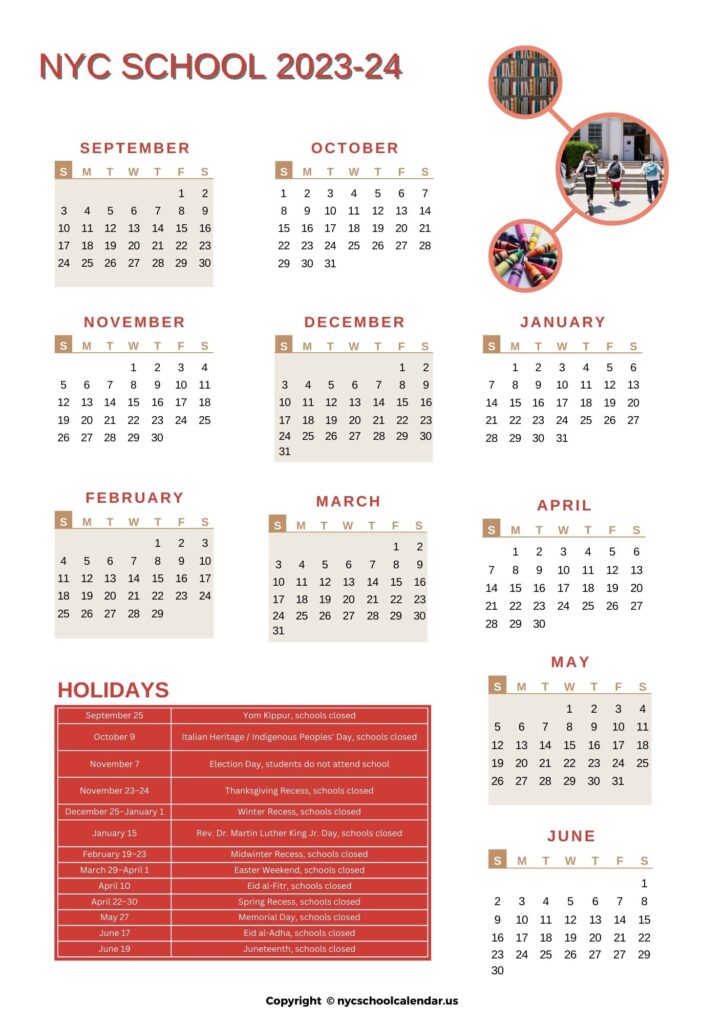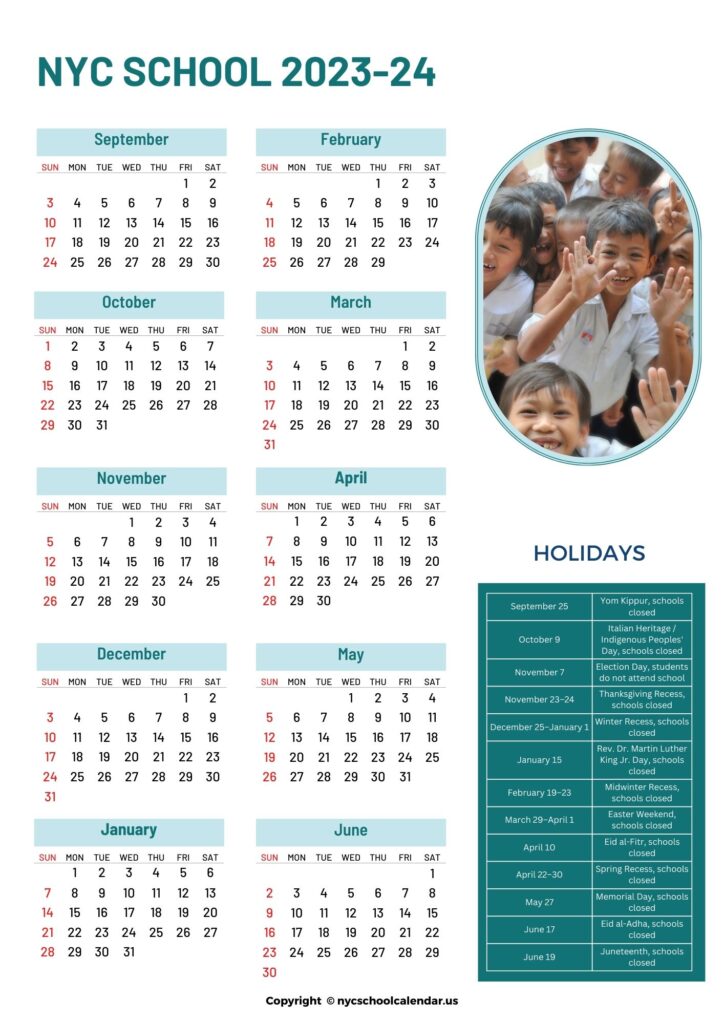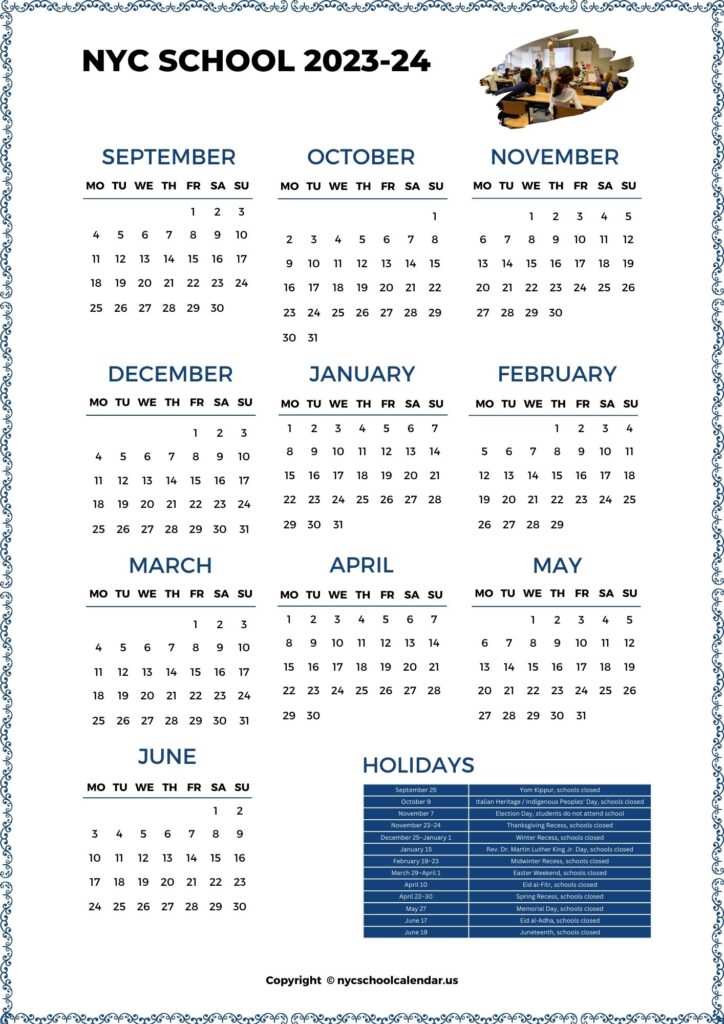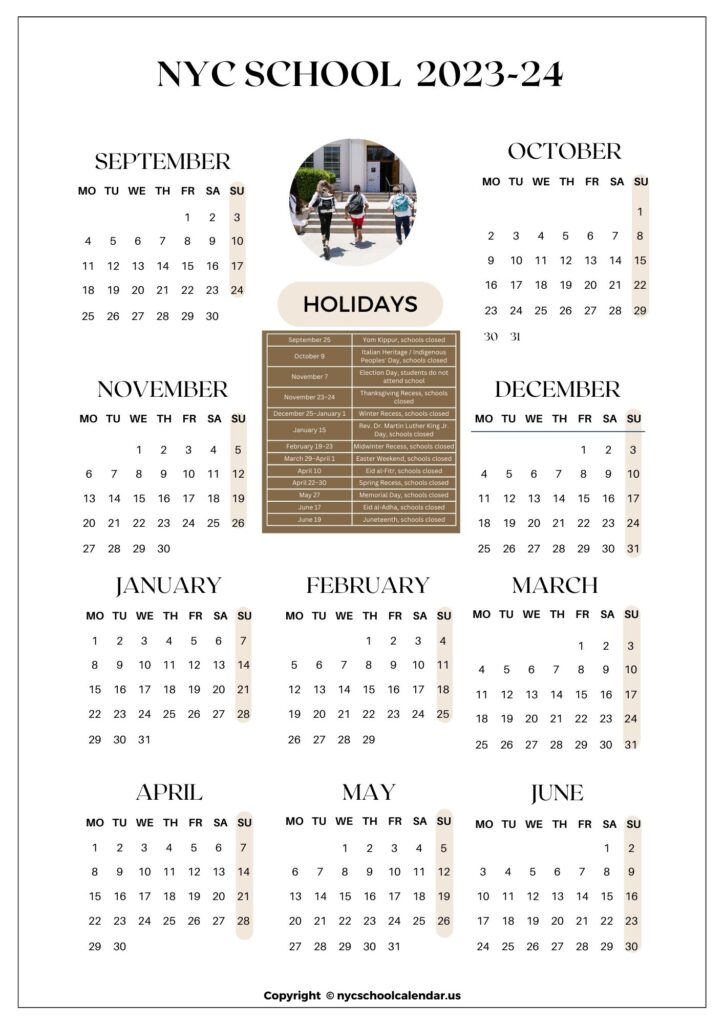NYC School Calendar 2023-24 – In New York, the school schedule typically follows a pattern similar to many other states in the United States. The academic year for schools in New York generally starts in early September and extends until late June. However, specific start and end dates can vary between school districts and levels of education.
NYC School Calendar 2024-25 [Holidays]
The school year consists of approximately 180 instructional days and includes various breaks and holidays. Students typically have a winter break around the December holidays, a mid-winter break in February, and a spring break in April. In addition to these breaks, schools are usually closed for holidays such as Labor Day, Thanksgiving, Christmas, New Year’s Day, Martin Luther King Jr. Day, Presidents’ Day, and Memorial Day.
| Holiday | Date |
| Labor Day | September 6 |
| Thanksgiving Break | November 25-26 |
| Winter Break | December 24-January 1 |
| Martin Luther King Jr. Day | January 17 |
| Mid-Winter Break | February 21-25 |
| Spring Break | April 18-22 |
| Memorial Day | May 30 |
The exact dates for the start of the school year, breaks, and holidays can vary based on the school district’s academic calendar. It’s important to note that school calendars can change from year to year due to factors like weather-related closures or specific local considerations.
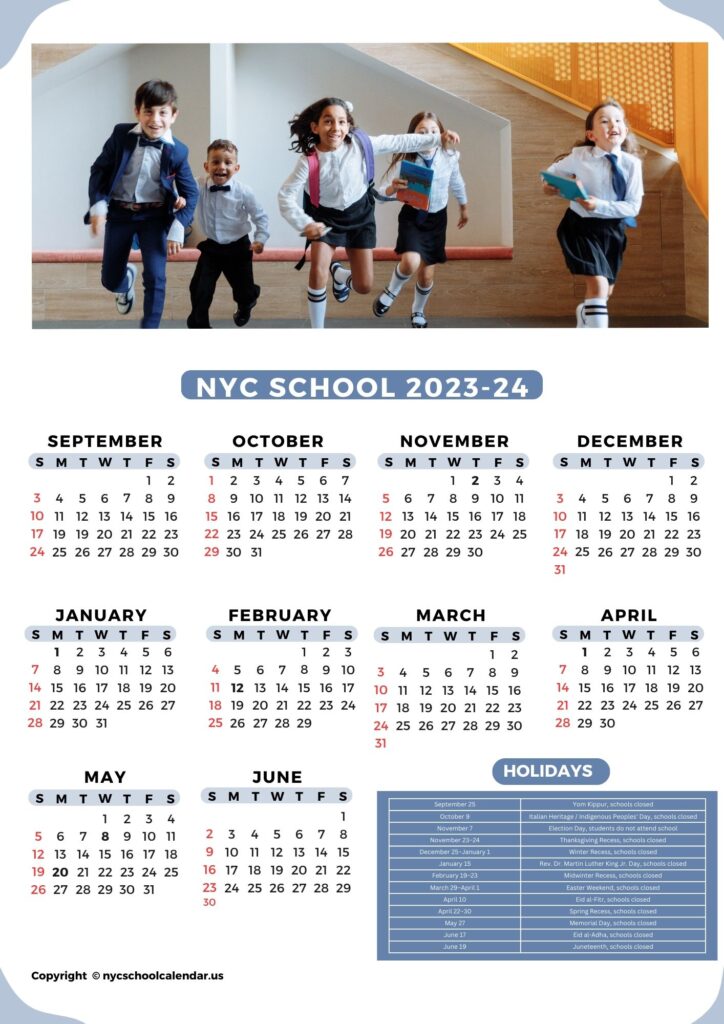
| Date | Event |
| September 5, 2024 | First Day of School for Students |
| September 12, 2024 |
Evening Parent-Teacher Conferences (Elementary)
|
| September 19, 2024 | Evening Parent-Teacher Conferences (Middle) |
| September 26, 2024 | Evening Parent-Teacher Conferences (High) |
| October 3-4, 2024 | Rosh Hashanah, Schools Closed |
| October 14, 2024 | Italian Heritage/Indigenous Peoples’ Day |
| November 1, 2024 | Diwali, Schools Closed |
| November 5, 2024 | Election Day, Students Do Not Attend |
| November 11, 2024 | Veterans Day, Schools Closed |
| November 28-29, 2024 | Thanksgiving Recess, Schools Closed |
| December 23, 2024 – January 1, 2025 | Winter Recess, Schools Closed |
| January 20, 2025 | Dr. Martin Luther King Jr. Day, Schools Closed |
| February 17-21, 2025 | Midwinter Recess, Schools Closed |
| April 14-22, 2025 | Spring Recess, Schools Closed |
| May 26, 2025 | Memorial Day, Schools Closed |
| June 19, 2025 | Juneteenth, Schools Closed |
| June 26, 2025 | Last Day of School for Students |
The New York City Department of Education’s academic year typically follows a pattern that aligns with many other educational institutions in the United States.
NYC DOE School Calendar 2024 [New York City Department of Education]
Below is the NYC School Calendar –
The school year usually begins in early September and ends in late June, consisting of approximately 180 instructional days. The following is a general outline of the school schedule, including key events and holidays:
- September: The school year kicks off with the first day of classes, which usually falls around the first week of September. Labor Day is observed as a holiday in early September, providing a long weekend.
- November: Students and educators observe Election Day and Veterans Day in November. A break for Thanksgiving is typically scheduled towards the end of the month.
- December-January: Winter Break encompasses the last week of December and the beginning of January. During this period, schools are closed for the holiday season.
- January-February: The school schedule includes holidays such as Martin Luther King Jr. Day and Presidents’ Day, providing short breaks in January and February.
- April: Spring Break, usually scheduled in April, offers students and staff a chance to recharge before the final stretch of the school year.
- April-May: Holidays like Passover and Good Friday may be observed during this time, offering additional breaks.
- May: Memorial Day is observed at the end of May, providing a long weekend for students and educators.
- June: The school year concludes in late June, marking the last day of classes for students.
NYC DOE Exam Pattern [NYC School Calendar]
The New York City Department of Education (NYC DOE) exam pattern can vary depending on the grade level, subject, and specific school. Below, We’ll provide a general overview of the exam pattern that might be observed in NYC DOE schools, particularly in public schools:
Elementary and Middle Schools:
- In elementary and middle schools, students usually take standardized exams in subjects such as English Language Arts (ELA) and Mathematics. These exams are typically aligned with the Common Core State Standards.
- Exams might be administered annually, usually in the spring, to assess students’ progress in these core subjects.
- Students may also take exams in other subjects such as science and social studies, depending on the curriculum.
High Schools:
- In high schools, the exam pattern can be more varied and may depend on factors such as the type of high school (e.g., traditional, specialized, charter) and the grade level.
- High school students may take Regents Examinations, which are standardized exams required for graduation in New York State. These exams cover subjects such as English, Mathematics, Science, and Social Studies.
- Advanced Placement (AP) exams may also be offered in high schools for students taking AP courses. These exams can earn students college credit if they earn a qualifying score.
- In addition to state and standardized exams, high school students might also take school-specific assessments and midterms/finals.
The New York City Department of Education (NYC DOE) oversees a vast number of public schools with diverse curricula, and private schools in the city offer a wide range of syllabi based on different educational philosophies and curricular standards.
Providing details about the syllabus for all schools in NYC is not feasible in a single response due to the extensive variety of schools and curricula.
New York School Syllabus
However, I can give you a general overview of what you might find in the syllabi of schools in NYC:
Public Schools (NYC DOE):
- The NYC DOE follows state and national standards, with a focus on the Common Core State Standards for English Language Arts (ELA) and Mathematics.
- Schools often provide a well-rounded education that includes subjects such as science, social studies, physical education, and the arts.
- The syllabus may include specific grade-level standards and learning objectives for each subject.
Private Schools:
- Private schools in NYC can follow a range of curricula, including state standards, national standards, and alternative educational philosophies.
- Some private schools may offer specialized curricula, such as Montessori, Waldorf, or International Baccalaureate (IB).
- The syllabus will depend on the school’s educational philosophy, goals, and any affiliations (religious, cultural, etc.).
New York High School Syllabus
The syllabus for high schools in New York City can vary widely based on the school’s focus, curriculum, and educational philosophy. Public high schools in NYC generally follow state and city education standards, while private schools may offer various curricula, including Advanced Placement (AP) courses, International Baccalaureate (IB) programs, and specialized tracks. Below is a general overview of what a high school syllabus in NYC might include:
Core Subjects:
- English Language Arts (ELA): Focus on literature analysis, writing skills, critical thinking, and communication. Students explore various genres, read classic and contemporary texts, and develop strong writing abilities.
- Mathematics: Progresses from algebra to geometry, trigonometry, calculus, and statistics. High school math emphasizes problem-solving, mathematical reasoning, and practical applications.
- Science: Subjects can include biology, chemistry, physics, and earth science. Labs and hands-on experiments are crucial components. AP science courses might be offered for students seeking advanced challenges.
- Social Studies: Covers U.S. history, world history, government, economics, and geography. Students learn about historical events, societal structures, and political systems.
Elective and Specialized Courses:
- Foreign Languages: Spanish, French, Mandarin, and other languages are often offered. Advanced language courses might explore literature, culture, and conversation skills.
- Arts: Visual arts, music, theater, and dance courses allow students to explore creative expression. Advanced courses may cover art history, performance, and production.
- Physical Education: Students engage in physical activities and learn about health, fitness, and wellness.
Advanced Programs and Electives:
- Advanced Placement (AP): AP courses offer college-level content and prepare students for AP exams that can earn them college credit. Subjects range from AP Calculus to AP Literature.
- International Baccalaureate (IB): Some schools offer the IB program, which emphasizes interdisciplinary learning, critical thinking, and a global perspective.
- Career and Technical Education (CTE): Courses in fields like technology, engineering, healthcare, and business prepare students for future careers.
Assessments and Graduation Requirements:
- Regents Examinations: In New York State, students are required to pass Regents Exams in various subjects to earn a high school diploma.
- Standardized Tests: Students often take the SAT or ACT as part of college admission requirements.
- Senior Projects/Capstone Projects: Some schools require seniors to complete a project that demonstrates their skills and knowledge in a particular area.
NYC School Calendar with Holidays 2024 and 2025
Types of NYC Schools in New York
- Public Schools: Over 4,600 public schools in total, including elementary, middle, and high schools, spread across different school districts.
- Charter Schools: New York has a significant number of charter schools, which are publicly funded but independently operated. The number of charter schools in the state can vary over time.
- Private Schools: New York is home to a large number of private schools, including independent, parochial, and other non-public institutions.
- Special Education Schools: These schools cater specifically to students with special needs, providing tailored education and support.
- Vocational and Technical Schools: Schools that offer specialized training and education in vocational and technical fields.
- Magnet Schools: These schools often have a specific focus, such as arts, science, or technology, and attract students based on their interests and talents.
- Alternative Schools: Schools designed for students who may not thrive in traditional educational settings, providing different approaches to learning.
- Boarding Schools: Some private schools in New York offer boarding options for students who live on campus.
- Language Immersion Schools: Schools that provide instruction primarily in a language other than English, promoting bilingualism and language proficiency.
NYC Law Schools List:
Some of the well-known and reputable law schools in New York include:
- Columbia Law School
- New York University (NYU) School of Law
- Cornell Law School
- Fordham University School of Law
- Benjamin N. Cardozo School of Law (Yeshiva University)
- Brooklyn Law School
- Albany Law School
- Syracuse University College of Law
- St. John’s University School of Law
- University at Buffalo School of Law (SUNY Buffalo Law School)
NYC Medical Schools List:
Some of the notable medical schools in New York include:
- Columbia University Vagelos College of Physicians and Surgeons
- Weill Cornell Medicine
- New York University (NYU) Grossman School of Medicine
- Icahn School of Medicine at Mount Sinai
- Albert Einstein College of Medicine
- University of Rochester School of Medicine and Dentistry
- SUNY Downstate Medical Center College of Medicine
- SUNY Upstate Medical University
- University at Buffalo Jacobs School of Medicine and Biomedical Sciences
- Hofstra Northwell School of Medicine
NYC School Calendar – For all types of schools
New York City’s diverse educational landscape encompasses various types of schools, each with its own academic calendar and holidays. Public schools in the city generally follow a calendar that spans from early September to late June. This includes both traditional public schools and charter schools. Throughout the academic year, students and educators alike observe a range of holidays, such as Labor Day, Thanksgiving, and Martin Luther King Jr. Day.
The winter break, typically spanning late December into early January, offers a respite for all. Furthermore, the spring break provides a breather as students gear up for the final stretch of the year. It’s essential to note that religious holidays are recognized, accommodating the city’s diverse population.
Private schools, parochial schools, and specialized schools like art schools or language immersion programs also adhere to their own unique calendars, often combining holidays with their respective educational objectives. The dynamic ebb and flow of New York City’s school calendars mirror the vibrant energy of the city itself, acknowledging tradition, fostering education, and celebrating the melting pot of cultures that define the city.
![NYC School Calendar Holidays [New York]- NYC DOE Calendar❤️](https://nycschoolcalendar.us/wordpress/wp-content/uploads/2023/09/nyc-school-calendar.png)
